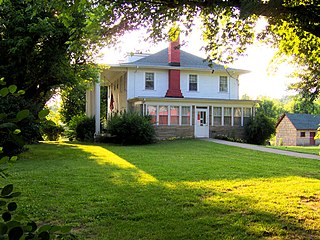 W
WFort Loudoun was a British colonial-era fort located in what is now Monroe County, Tennessee, United States. Built in 1756 and 1757 to help garner Cherokee support for the British at the outset of the Seven Years' War, the fort was one of the first significant British outposts west of the Appalachian Mountains. The fort was designed by John William G. De Brahm, its construction was supervised by Captain Raymond Demeré, and its garrison was commanded by Demeré's brother, Paul Demeré. It was named for the Earl of Loudoun, the commander of British forces in North America at the time.
 W
WFort Southwest Point was a federal frontier outpost at what is now Kingston, Tennessee, in the southeastern United States. Constructed in 1797 and garrisoned by federal soldiers until 1811, the fort served as a major point of interaction between the Cherokee and the United States government as well as a way station for early migrants travelling between Knoxville and Nashville.
 W
WThe Mississippi River Museum is a museum located on Mud Island, in Memphis, Tennessee.
 W
WSgt. Alvin C. York State Historic Park is a state park in Pall Mall, in the U.S. state of Tennessee. Situated along the Wolf River, the park contains the farm and gristmill once owned by decorated World War I soldier Alvin C. York (1887–1964), who lived in the Pall Mall area for his entire life. Along with the millhouse and milldam, the park includes York's two-story house, York's general store and post office, the Wolf River Cemetery, the Wolf River Methodist Church, the York Bible Institute, and various picnic facilities.
 W
WSycamore Shoals State Historic Area is a state park located in Elizabethton, in the U.S. state of Tennessee. The park consists of 70 acres (28.3 ha) situated along the Sycamore Shoals of the Watauga River, a National Historic Landmark where a series of events critical to the establishment of the states of Tennessee and Kentucky, and the settlement of the Trans-Appalachian frontier in general, took place. Along with the historic shoals, the park includes a visitor center and museum, the reconstructed Fort Watauga, the Carter Mansion and Sabine Hill . For over a thousand years before the arrival of European explorers, Sycamore Shoals and adjacent lands had been inhabited by Native Americans. The first permanent European settlers arrived in 1770, and established the Watauga Association—one of the first written constitutional governments west of the Appalachian Mountains—in 1772. Richard Henderson and Daniel Boone negotiated the Treaty of Sycamore Shoals in 1775, which saw the sale of millions of acres of Cherokee lands in Kentucky and Tennessee and led to the building of the Wilderness Road. During the American Revolution, Sycamore Shoals was both the site of Fort Watauga, where part of a Cherokee invasion was thwarted in 1776, and the mustering ground for the Overmountain Men in 1780.
 W
WThe Tennessee State Museum is a large museum in Nashville depicting the history of the U.S. state of Tennessee. The current facility opened on October 4, 2018, at the corner of Rosa Parks Boulevard and Jefferson Street at the foot of Capitol Hill by the Bicentennial Capitol Mall State Park. The 137,000-square-foot building includes a Tennessee Time Tunnel chronicling the state's history by leading visitors though the museum's permanent collection, a hands-on children's gallery, six rotating galleries, a digital learning center, and a two-story Grand Hall. Exhibitions include significant artifacts related to the state's history, along with displays of art, furniture, textiles, and photographs produced by Tennesseans. The museum's Civil War holdings consists of uniforms, battle flags, and weapons. There is no admission charge for visitors.
 W
WArnold Field is a municipal public-use airport located two miles (3 km) northwest of the central business district of Halls, a town in Lauderdale County, Tennessee, United States. The airport is named for a former Mayor, Sammie Arnold